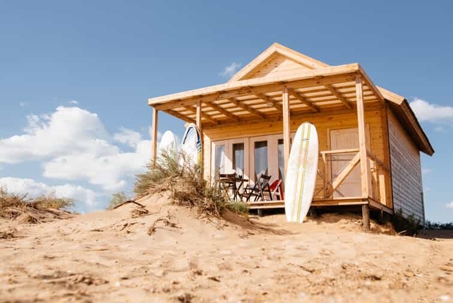Do you own a beach house, ski chalet, resort condo or another vacation getaway? Perhaps it's the place where cherished family reunions take place with your children and grandchildren. Many people with second homes want them to stay in the family but also want to limit estate and gift taxes upon their transfer. One way to achieve this might be to create a qualified personal residence trust (QPRT).
With a QPRT, you basically transfer ownership of your personal residence or vacation home to a trust while you retain the right to use the property during the trust term. After that, your children or other designated beneficiaries become the owners of the property. If you still want to use the property, you can work out a rental arrangement with them.
How Is the Property Valued?
The gift's value is determined by calculating the home's present value discounted over the trust's term using an interest rate specified by the IRS.
Any future appreciation on the property is removed from your estate. That is because the value of the gift is determined on the date the house is placed in trust.
Current interest rates and home values do affect a qualified personal residence trust. Your attorney and tax advisor can explain the specifics in your situation.
Estate and Gift Tax Benefits
The advantages of a QPRT. It allows you to get your home out of your taxable estate at a reduced tax cost, described in the right-hand box. And the trust creation is a private transaction so it may not subject the property to probate.
Transferring property to a QPRT is considered a taxable gift, but you get a substantial break. The value of the house is discounted for gift tax purposes because you're allowed to continue using it for the term of the trust.
A QPRT can potentially save your heirs a large amount in taxes. However, the trust is irrevocable and the tax rules are complex. So you need to understand the pros and cons before you give away such a valuable asset — and one that you may be emotionally attached to as well.
Here are three considerations when establishing a QPRT:
1. Get professional help. Consult with your attorney and tax advisor. QPRTs are complex and mistakes could invalidate the trust.2. Don't pick a trust term that is too long. Your goal is to continue using the home while getting it out of your taxable estate. So choose a term for the trust that you expect to outlive. If you die before the end of the term, the home goes back into your taxable estate with no tax savings.
3. Think about the future. If you're planning to rent the house from your children or other beneficiaries after the trust ends, don't make the future rental a provision of the QPRT. The IRS could invalidate the trust. Don't set up a QPRT unless you have a good relationship with the beneficiaries, including in-laws. You don't want to worry about being forced to move someday after the trust ends.
For some families, passing a cherished vacation home on to the next generation is an important goal. A qualified personal residence trust might provide a way to achieve that goal at a reduced tax cost. If you are interested in a QPRT or other estate planning options, consult with your estate advisor.

